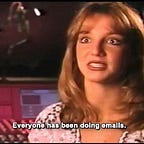Putting an End to Net Neutrality
What it would mean for improving discourse and competition on the Web
The World Wide Web was invented to spread information via message boards and weblogs. This information, just like anything spread by word of mouth or print, is always up for debate. And with such a diverse group of people having access to the Web, there are many sides, voices and tones used to decide The Right Way™ to do or use or pick things.
Rhetoric is everything when it comes to the Net, but the latest war of words has nothing to do with JavaScript tool sets or tech hub gentrification. Ironically, the battle is over net neutrality — the ability to be involved in a discussion on the Net without being required to publicly pick a specific side.
I say “ironically” because it is a debate over debates, and the heavy hitters in the debate happen to be direct competitors of each other: telecom companies like AT&T, Verizon, and Comcast.
The important thing to remember about Net Neutrality is that there are different levels of it — not everything is black and white like most tech-focused debates on the Net. Some go for a strong Net Neutrality, while others prefer a weaker one. Diversity has done wonders for the tech industry, so it is natural to see it do so for the Net. And the fact that the U.S. government has patented the Internet means that it can control what levels of neutrality users can hold in such arguments.
One would wonder how the U.S. government had achieved such a power grab on a network that is accessed on a nearly global scale, much like one would wonder how any entity could control how its users think about certain topics. But this isn’t new. Many countries are known for instituting rules on thinking. Even in the U.S., there exist thought leaders who are paid to enforce ideas.
So what is the upside to getting rid of the ability to remain neutral in a Net debate? With two distinct sides (weak/no Net Neutrality), each side is more likely to be able to convince one another of what the right argument is, therefore ending the debate. Those who were typically neutral and not providing any useful information via their “devil’s advocacy” or “rationalization” or “hypotheticals” of “empathy” would not be able to halt a discussion to provide time to think and go back and forth on how one should feel once all sides of a story are given.
One would perceive the best thing about getting rid of Net Neutrality to be the competition in the companies that are lobbying for or against it. Verizon support agents have come under fire for remaining neutral in the debate —the antithesis of the movement to get rid of Net Neutrality.
This is seen by many companies and customers as a poor business move, which could possibly lead to customers moving to other companies like Comcast for their Internet debate access. Verizon users on contract would end up with no access until the end of their contracts if the company were to shut down because of the existence of Net Neutrality. We engineers are heavily invested in telecom contracts, therefore the results of Net Neutrality lobbying would dramatically affect our ability to work.
“Net Neutrality is a social construct meant to be torn down and built from the ground up through agile paradigms, you fucking shitbirds.” — Linux Torvalds
How can engineers and non-engineers contribute to the debate over Net Neutrality? For one, pick a side. And contact your Internet Service Provider and ask them how they feel about Net Neutrality. Then decide if you trust them to make sure that everyone on the Net continues to have strong opinions about JavaScript, the fact that we have emotions, and whether we use tabs or spaces in our open source projects. Anyone who doesn’t pick a side is only derailing the evolution of web development by stalling it.
,Jenn Schiffer is a web developer who thinks comma-first in JavaScript code looks ridiculous.
